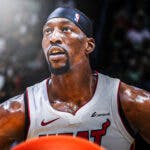Following the news that the Houston Rockets and DeMarcus Cousins were on the precipice of a breakup, the rumor mill surrounding the NBA kicked into high gear in an attempt to puzzle out where the big man could be headed to next. While Cousins' name is a more prominent headline at this point in his career than his production on the court, the former All-NBA standout is still more than capable of contributing in a rotation role.
In 25 games this season, DeMarcus Cousins has averaged over nine points per contest to go along with seven rebounds in just 20 minutes of action. While his 34% mark from behind the line is hardly anything to write home about, it does allow the center to be a viable option for teams looking to station two bigs on the court at the same time.
Even if he doesn't sprint out to the line to create space for a teammate to work in the interior, Cousins still possesses enough passing ability from the elbow to allow someone to station themselves in the dunker's spot, waiting to eat what DeMarcus Cousins feeds them.
However, it's the center's performance on the ball's defensive side that could make him a legitimate difference-maker down the stretch. Not only is he using his size and strength to tag smaller ballhandlers off of picks–altering their angles just enough that it takes a half-second longer for them to get to the basket, and in turn, allows the help behind him the time needed to rotate over–but he is closing out surprisingly fast for a man who suffered both an Achilles and ACL tear. All told, DeMarcus Cousins is limiting opponents to .9 points per possession on picks and rolls and an astonishing .7 points per possession on spot-up jump shots, ranking in the 92nd percentile (!!) according to Synergy Sports.
Even if you're screaming about the small sample size vacuum those numbers have taken place in–and quite frankly understandably so–that is still enough evidence to justify those minutes in which DeMarcus Cousins works as the lone big.
The question, then, is not so much if Cousins should find another home, but where. To answer that, here are the top three destinations for DeMarcus Cousins.
DeMarcus Cousins targets:
3. Toronto Raptors
With the offseason losses of both Marc Gasol and Serge Ibaka, the Raptors lost not only their interiors stalwarts but two of the most important secondary playmakers on the team. While Kyle Lowry and Fred VanVleet sat atop the squad in usage rate–and still do–Ibaka and Gasol ranked fifth and seventh respectively in the same metric, per Cleaning the Glass, with their passing ability near the top of the key serving as two of the biggest reasons why Toronto's depth was so effective.
Following the pair's decisions to exchange their passports for warmer pastures in Los Angeles, the Raptors have tried to make do with a couple of backup options in Chris Boucher and Aron Baynes.
While Boucher has performed admirably–even if his PER numbers are vastly overinflated–Baynes has been a sieve on defense while failing to duplicate the offensive performance he gave last season in Phoenix. Not only has his three-point percentage declined to 21%, but the big man is turning the ball over nearly 15% of the time, ensuring that he plays no more than 20 minutes a game.
Given that Toronto still has designs on competing in the playoffs, an upgrade at the center position is vital. Enter DeMarcus Cousins.
Not only would Cousins provide a decent facsimile of the type of playmaking that Gasol and Ibaka provided, but the big man would serve as an option capable of balancing the floor while still collecting rebounds. With the Raptors forced to play smaller lineups due to Baynes' struggles, the team has slid to 26th in rebounding rate, a potential killer in a postseason series. While he may not propel them to championship contention, DeMarcus Cousins answers many questions for the Toronto Raptors.
2. Miami Heat
Though Bam Adebayo's presence anchors the Heat in the interior, the team still finds itself in need of a second option down low. While Kelly Olynk has done an adequate job for most of the year, it's doubtful that the Heat are confident playing the forward 26 minutes a game for the remainder of the season, given his past habit of inconsistency. With the team scuffling along at only 13-17 following their victory against the Lakers Saturday night, the urgency to acquire an upgrade has never been higher.
In acquiring Cousins, not only would the Heat gain an insurance policy if Olynk's performance woes return–and as any Heat fan can tell you, they almost certainly will rear their head up at some point–but a defender who can crash the boards with the best of them. While Miami would likely prefer finding a forward on the market that would assimilate into their lineup next to Adebayo, the Heat have sunk low enough that they no longer possess the time to be choosy.
They are in desperate need of a player who can boost them on the glass while not hurting them on the offensive side of the ball–where they are averaging a feeble 107 points per game. If that player can also improve their shooting behind the arc, the team will be that much better off.
In DeMarcus Cousins, the Heat may have found that man.
1. Brooklyn Nets
For all the talent the Nets possess, it's not difficult to pinpoint their weakness. Following the loss of Jarrett Allen in the trade to acquire James Harden, the Nets have come to rely on DeAndre Jordan and Jeff Green to man the interior. While both have performed above expectations thus far–specifically Jordan, who so far grades out as a plus-defender according to tracking data–the two big men possess enough limitations that Brooklyn's coaching staff has had to adjust. Imagine how DeMarcus Cousins can fit here.
Whereas the Nets could once feel comfortable switching on the action involving Allen, the team is keenly aware of the limitations Jordan has against quicker players and has fought off switching with increasing frequency. While fighting to avoid mismatches as much as possible has been part of the reason the team has improved defensively as of late, the amount of effort required to sustain that level of success could prove taxing in the long-term.
Cousins' addition to the roster would provide another body to a team in need of quality players down the bench and serve as a potential bridge through those minutes when the Nets decide to switch the action. As Cousins' numbers in the pick-and-roll show, the big is an adequate defensive option on smaller guards and would prove to be an upgrade over Jordan in those sets. Even if he regresses on defenses as the season wanes on, Cousins has shown enough mobility that the Nets can be confident he won't go crashing through the floor.
There's no arguing that Brooklyn holds the top-line talent to compete for a championship. What they lack is a center to help fortify their interior for the postseason matchups to come. Thankfully for the Nets, he just became available.




